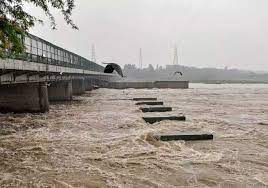BAHAWALNAGAR (INP): India has released surplus water from its water reservoirs in Sutlej River on Wednesday. India had also discharged 2,08,597 cusecs water from Harike and 1,10,568 cusecs from Ferozepur in River Sutlej in July. The water level being surged in Pakistan with discharge of water from India in Sutlej, officials said.
Provincial Disaster Management Authority (PDMA) Punjab had issued flood alert in rivers on Tuesday. The PDMA had issued instructions to the deputy commissioners of Bahawalnagar, Kasur, Okara, Pakpattan and Vehari for preparations to tackle emergency situation. All dams on Sutlej and Beas in India have been filled to the capacity and more rainfall expected in upper catchment areas of Sutlej and Beas rivers, PDMA spokesman said. “India could release surplus water from its water reservoirs”.
Heavy rainfall with thunderstorm is likely in catchment areas of major rivers in next 24 hours, according to the alert. “The monsoon rain spell will likely to continue till August 23,” according to the PDMA. “Flooding is expected in Sutlej River at Ganda Singh Wala and low-lying areas,” PDMA stated.
Met Office has forecast more monsoon rains in upper parts of the country. Moderate to heavy falls may increase the water flows in local Nullahs/streams of Kashmir, Gilgit-Baltistan, Chitral, Dir, Swat, Kohistan, Shangla, Buner, Mansehra, Abbottabad, Rawalpindi and Islamabad, according to the Pakistan Meteorological Department (PMD).
Mangla Dam one feet shy of full capacity: The water level in Mangla Dam has risen to 1,241 feet which is only one foot lower than its maximum capacity of 1,242 feet on Wednesday. The Water and Power Development Authority (Wapda) has alerted the local administration about the release of 75,000 cusecs of water into the Jhelum River from August 17.
The Jhelum administration has also put the departments concerned on high alert. It also advised the people living along the banks of the Jhelum River to move to safe places. “There is no flooding threat in the Jhelum River.







